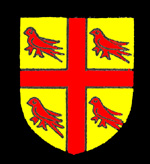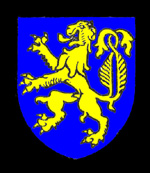The Manor of Northill

The Trailly family coat of arms
Volume III of The Victoria County History for Bedfordshire, published in 1912, gives the histories of all the manors in the parish of Northill as far as they were known at the time. Northill Manor is traced back to the 6½ hide holding of William Speke or Espec recorded in the Domesday Book of 1086. The manor included half a mill which, in 1086, can only have been a watermill as no windmills were known in England at that date. The Speke family held the manor until the death of Walter Speke in 1183 when it passed to his second sister Albreda, wife of Nicholas de Trailly.
The de Trailly family held Northill Manor until 1401 when Reginald Trailly alienated it to Sir Gerard Braybrooke the younger and other executors. By 1428 the manor was held by Henry Godfrey, husband of Joan, daughter of John de Meppershall, to whom, the Victoria County History supposes, Trailly's executors had alienated it. Richard Godfrey, Henry's son, died towards the end of the 15th century and Northill Manor went to one of his daughters. Richard Harding was in possession in 1584. He died in 1600. He was succeeded by his son Lewis, who died in 1616 and his daughter Elizabeth, wife of Edward Kent succeeded him.

The Bromsall family coat of arms
The next known reference to Northill Manor is in 1652 when Thomas Ellis conveyed the manor to Thomas Bromsall. The Bromsall family held the manor into the 18th century it passed to the Robinson family of Denston Hall in Suffolk, the Victoria County History states through the marriage of Frances Bromsall with John Robinson.
The manor was purchased from another John Robinson in 1802 by John Harvey of Ickwell Bury. The manor remained in the Harvey family until a succession of Law of Property Acts in the 1920s abolished manorial fines and incidents as well as copyhold land tenure, thus abolishing manors in practically all but name.